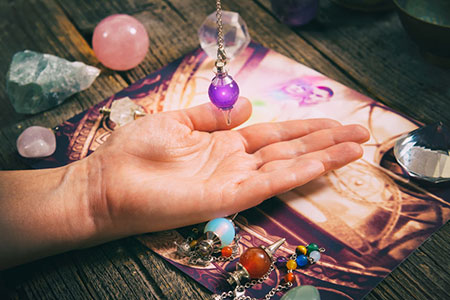spirituality
The 2020 Ascension Breakthrough
 There’s a spiritual emergence happening this year. The year 2020 brings subtle energy shifts that will propel us forward toward our soul-aligned desires.
There’s a spiritual emergence happening this year. The year 2020 brings subtle energy shifts that will propel us forward toward our soul-aligned desires.
This year has a higher vibration that holds tremendous potential for us to reach our dreams by first changing from within. For once we begin to exist in a way that the universe blesses, we will witness divine forces complement our inner-directed changes by manifesting it externally.
Simply put, 2020 will be a year of supported growth and great ascension. What is more, believing in this gateway to enlightenment will be the key to unlocking your personal power.
As we are all co-creators of our reality, we may have inadvertently created an existence that simply goes against the grain, and stifles our prosperity. This is due to outer influences, karmic blocks and limiting beliefs imposed on us through our many experiences on this Earth.
Fortunately, anything obstructive can no longer survive in the emerging 2020 rebirth, whether it is a career, relationship or social structure. All that no longer serves us, must begin to crumble away this year, and we must allow its fall, so that harmony and fulfillment can enter our lives.
With that it’s time to loosen the reigns and worry less about getting an external grip. No need to force matters, or control people or situations this year. You only need to resolve to take care of yourself. This extra dimensional dynamism offers a paved path to increase your capacity to live a life that is in alignment with who you authentically are, by elevating your awareness.
Roadblocks To Spiritual Growth
 The spiritually aware person is by nature more open, attuned and sensitive to everything around them: spiritually, emotionally, and physically. Letting all that additional energy flow in can be empowering, but also exhausting.
The spiritually aware person is by nature more open, attuned and sensitive to everything around them: spiritually, emotionally, and physically. Letting all that additional energy flow in can be empowering, but also exhausting.
You also may find yourself adrift and lacking in purpose when it comes to your spiritual development and growth. Maybe you’re asking what is your life’s mission, or purpose? This kind of confusion and procrastination is common when you are experiencing energetic overload, or not appropriately investing your time and energy. But the good news is, it can be overcome.
Guidance
So many of us struggle with the big questions: why are we here, and what are we meant to do? But there is no right or wrong answer to this question. Asking your spirit guides, a mentor or a community of like-minded people for help on your journey is usually a step in the right direction. Be open and honest when you ask for guidance, and accept that the answers may not always be the ones you are expecting.
Practice
Instead of practicing our spirituality, we often spend a lot of time reading books or watching instructional videos on how to do it. The truth is, you already have all the spiritual skills you need, or you’re able to intuit them. Instead, actively practice your spirituality each day. Don’t be afraid of failure or shortcomings, because there is no such thing spirituality.
Being Grateful For Every Thank You
 It occurred to me recently, while I was out driving in the Spanish countryside where I now live, that most of the local people appear to be really happy and content. They often talk of things they are grateful for, and these are rarely their material belongings. Then I had a big ‘aha’ moment!
It occurred to me recently, while I was out driving in the Spanish countryside where I now live, that most of the local people appear to be really happy and content. They often talk of things they are grateful for, and these are rarely their material belongings. Then I had a big ‘aha’ moment!
As a child I grew up in various Spanish speaking places. I learned, when someone thanks you for something, the appropriate response is to say, “De nada!” In other words, ‘it’s nothing,’ or ‘don’t mention it.’
On my return to Spain a few years ago, I discovered a different response to a thank you. These days a gracias (thank you) is responded to with gracias a ti (thanks to you). Also what I noticed is, when I got thanked in return, it felt really good, as if good energy was being directed my way.
I met one of my Spanish friends for coffee today. We both enjoy our chats about all things spiritual. She is studying metaphysics in various disciplines, and I have read for her, as well as her mom. I brought up this topic about how ‘thank you’ is replied to differently, compared to when I first started learning Spanish many years ago. “It is not entirely the case,” she responded. “There are still those who say de nada.”
The Laying On Of Hands
 The laying on of hands, also known as the imposition of hands, is a ritual act performed in some religious and spiritual traditions. It is used for the purpose of ordination, healing, or the transmission of a spiritual gift or blessing. In this blog article I will explore the different traditions and how they use this ancient practice in diverse ways, with a special focus on healing.
The laying on of hands, also known as the imposition of hands, is a ritual act performed in some religious and spiritual traditions. It is used for the purpose of ordination, healing, or the transmission of a spiritual gift or blessing. In this blog article I will explore the different traditions and how they use this ancient practice in diverse ways, with a special focus on healing.
Judaism
The hands are of particular importance in certain Jewish religious rituals. Deuteronomy 34:9 describes, for example, how Moses laid hands on Joshua, his successor. The term used for it is semicha, meaning ‘leaning of the hands.’
It is also associated with sacrifice. Thousands of years ago, priests practiced semicha by laying hands on the sacrifices right before offering was made. Moses tells Aaron, “This is the thing that God commanded you to do, that God’s presence may appear.” It is understood that this passage in Leviticus 9 refers to the laying on of hands.
Christianity
In the New Testament we find a continuation of the Jewish practice of semicha, still connected to the liturgies of ordination and now also of baptism, in both of which the imposition of hands is an important part of the ritual.
Ordination involves conveying a gift and an authority within the Church. The imposition of hands connected with baptism is a means whereby the convert is born to the ecclesia, or the Christian community. The action itself of laying on hands is connected with the gift of the Holy Spirit and is also used to convey a blessing. For example, in Acts 6:6: “These they set before the apostles, and they prayed and laid their hands on them.” It is also practiced as a means of healing (Luke 4:40).
The Key Is In Your Hands
 I received a lovely necklace as a gift recently, with a beautiful center stone and a small ‘skeleton key’ at the bottom. A skeleton key is a type of master key in which the serrated edge has been removed so that it can open numerous locks .I’ve seen these keys before, and remembered vaguely the symbolism, but I decided to refresh my knowledge by researching further the significance of this symbol.
I received a lovely necklace as a gift recently, with a beautiful center stone and a small ‘skeleton key’ at the bottom. A skeleton key is a type of master key in which the serrated edge has been removed so that it can open numerous locks .I’ve seen these keys before, and remembered vaguely the symbolism, but I decided to refresh my knowledge by researching further the significance of this symbol.
Katie Pifer writes that keys have had a variety of spiritual symbolisms attached to it “for as long as man has had locks. They are connected with gateways and portals, doorways to the unknown, knowledge, mysteries, powers, initiations, new ways, forbidden things and answers to curious questions.”
Keys symbolize our ability to gain access to those things of either a material or spiritual nature that are of the greatest importance to us. The key is an object symbolic not only of opening doors to new paths that align with our desires, but also closing and locking doors to those things that we wish to leave behind.
Skeleton keys are considered to be a more powerful symbol, since they can open many different locks. Thus, they have been perceived to be the powerful ‘keys to the Kingdom,’ or the key to that someone special’s heart, and so on.
Skeleton Keys are traditionally also worn as powerful amulets. It is thought to be good luck to touch a key when you are entering a challenging or dangerous situation, because keys are believed to keep you safe. They are also symbolic of transformation, freedom and liberation.

